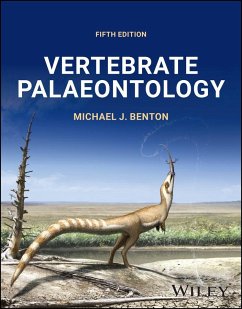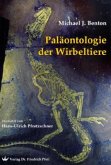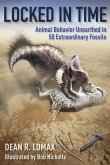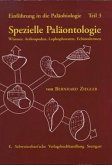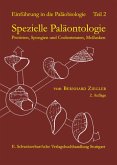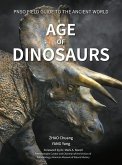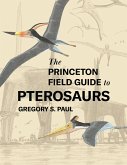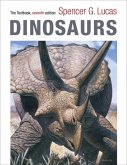Michael J. Benton
Vertebrate Palaeontology
64,99 €
inkl. MwSt.
Versandkostenfrei*
Liefertermin unbestimmt
Melden Sie sich
hier
hier
für den Produktalarm an, um über die Verfügbarkeit des Produkts informiert zu werden.
oder sofort lesen als eBook

32 °P sammeln
Michael J. Benton
Vertebrate Palaeontology
- Broschiertes Buch
Vertebrate palaeontology is a lively field, with new discoveries reported every week... and not only dinosaurs! This new edition reflects the international scope of vertebrate palaeontology, with a special focus on exciting new finds from China.
A key aim is to explain the science. Gone are the days of guesswork. Young researchers use impressive new numerical and imaging methods to explore the tree of life, macroevolution, global change, and functional morphology.
The fourth edition is completely revised. The cladistic framework is strengthened, and new functional and developmental…mehr
Andere Kunden interessierten sich auch für
![Paläontologie der Wirbeltiere Paläontologie der Wirbeltiere]() Michael J. BentonPaläontologie der Wirbeltiere48,00 €
Michael J. BentonPaläontologie der Wirbeltiere48,00 €![Locked in Time Locked in Time]() Dean R. LomaxLocked in Time16,99 €
Dean R. LomaxLocked in Time16,99 €![Einführung in die Paläobiologie 3 Einführung in die Paläobiologie 3]() Bernhard ZieglerEinführung in die Paläobiologie 349,00 €
Bernhard ZieglerEinführung in die Paläobiologie 349,00 €![Einführung in die Paläobiologie 2 Einführung in die Paläobiologie 2]() Bernhard ZieglerEinführung in die Paläobiologie 239,00 €
Bernhard ZieglerEinführung in die Paläobiologie 239,00 €![Age of Dinosaurs Age of Dinosaurs]() Yang YangAge of Dinosaurs27,99 €
Yang YangAge of Dinosaurs27,99 €![The Princeton Field Guide to Pterosaurs The Princeton Field Guide to Pterosaurs]() Gregory S. PaulThe Princeton Field Guide to Pterosaurs28,99 €
Gregory S. PaulThe Princeton Field Guide to Pterosaurs28,99 €![Dinosaurs Dinosaurs]() Spencer LucasDinosaurs87,99 €
Spencer LucasDinosaurs87,99 €-
-
-
-
-
-
-
-
-
-
-
-
-
Vertebrate palaeontology is a lively field, with new discoveries reported every week... and not only dinosaurs! This new edition reflects the international scope of vertebrate palaeontology, with a special focus on exciting new finds from China.
A key aim is to explain the science. Gone are the days of guesswork. Young researchers use impressive new numerical and imaging methods to explore the tree of life, macroevolution, global change, and functional morphology.
The fourth edition is completely revised. The cladistic framework is strengthened, and new functional and developmental spreads are added. Study aids include: key questions, research to be done, and recommendations of further reading and web sites.
The book is designed for palaeontology courses in biology and geology departments. It is also aimed at enthusiasts who want to experience the flavour of how the research is done. The book is strongly phylogenetic, and this makes it a source of current data on vertebrate evolution.
Hinweis: Dieser Artikel kann nur an eine deutsche Lieferadresse ausgeliefert werden.
A key aim is to explain the science. Gone are the days of guesswork. Young researchers use impressive new numerical and imaging methods to explore the tree of life, macroevolution, global change, and functional morphology.
The fourth edition is completely revised. The cladistic framework is strengthened, and new functional and developmental spreads are added. Study aids include: key questions, research to be done, and recommendations of further reading and web sites.
The book is designed for palaeontology courses in biology and geology departments. It is also aimed at enthusiasts who want to experience the flavour of how the research is done. The book is strongly phylogenetic, and this makes it a source of current data on vertebrate evolution.
Hinweis: Dieser Artikel kann nur an eine deutsche Lieferadresse ausgeliefert werden.
Produktdetails
- Produktdetails
- Verlag: Wiley & Sons
- Artikelnr. des Verlages: 1W118406840
- 4. Aufl.
- Seitenzahl: 480
- Erscheinungstermin: 10. Oktober 2014
- Englisch
- Abmessung: 279mm x 215mm x 27mm
- Gewicht: 1425g
- ISBN-13: 9781118406847
- ISBN-10: 1118406842
- Artikelnr.: 40888817
- Herstellerkennzeichnung
- Libri GmbH
- Europaallee 1
- 36244 Bad Hersfeld
- gpsr@libri.de
- Verlag: Wiley & Sons
- Artikelnr. des Verlages: 1W118406840
- 4. Aufl.
- Seitenzahl: 480
- Erscheinungstermin: 10. Oktober 2014
- Englisch
- Abmessung: 279mm x 215mm x 27mm
- Gewicht: 1425g
- ISBN-13: 9781118406847
- ISBN-10: 1118406842
- Artikelnr.: 40888817
- Herstellerkennzeichnung
- Libri GmbH
- Europaallee 1
- 36244 Bad Hersfeld
- gpsr@libri.de
Michael J. Benton FRS is Professor of Vertebrate Palaeontology at the University of Bristol. He is particularly interested in early reptiles, Triassic dinosaurs, and macroevolution, and has published over 50 books and 300 scientific articles. He leads one of the most successful palaeontology research groups at the University of Bristol, and has supervised over 60 PhD students.
List of boxes viii Preface x About the companion website xii 1 Vertebrates
Originate 1 Key questions in this chapter 2 Introduction 2 1.1 Sea squirts
and the lancelet 2 1.2 Ambulacraria: echinoderms and hemichordates 4 1.3
Deuterostome relationships 6 1.4 Chordate origins 8 1.5 Vertebrates and the
head 14 1.6 Further reading 14 Questions for future research 15 1.7
References 15 2 How to Study Fossil Vertebrates 18 Key questions in this
chapter 19 Introduction 19 2.1 Digging up bones 19 2.2 Publication and
professionalism 24 2.3 Geology and fossil vertebrates 29 2.4 Biology and
fossil vertebrates 33 2.5 Discovering phylogeny 36 2.6 The quality of the
fossil record 39 2.7 Macroevolution 41 2.8 Further reading 43 2.9
References 43 3 Early palaeozoic fishes 45 Key questions in this chapter 46
Introduction 46 3.1 cambrian vertebrates 46 3.2 vertebrate hard tissues 49
3.3 the jawless fishes 51 3.4 origin of jaws and gnathostome relationships
59 3.5 placoderms: armour-plated monsters 60 3.6 chondrichthyes: the first
sharks 65 3.7 acanthodians: the 'spiny skins' 65 3.8 devonian environments
67 3.9 osteichthyes: the bony fishes 70 3.10 early fish evolution and mass
extinction 79 3.11 further reading 79 Questions for future research 80 3.12
References 80 4 Early tetrapods and amphibians 84 Key questions in this
chapter 85 Introduction 85 4.1 Problems of life on land 85 4.2 Devonian
tetrapods 88 4.3 The Carboniferous world 96 4.4 Diversity of Carboniferous
tetrapods 98 4.5 Temnospondyls and reptiliomorphs after the Carboniferous
106 4.6 E volution of the modern amphibians 109 4.7 Further reading 114
Questions for future research 114 4.8 References 114 5 Evolution of early
amniotes 118 Key questions in this chapter 119 Introduction 119 5.1
Hylonomus and Paleothyris - biology of the first amniotes 119 5.2 Amniote
evolution 121 5.3 The Permian world 125 5.4 The parareptiles 125 5.5 The
eureptiles 128 5.6 Basal synapsid evolution 132 5.7 The Permo-Triassic mass
extinction 142 5.8 Further reading 143 Questions for future research 143
5.9 References 143 6 Bounceback: tetrapods of the Triassic 147 Key
questions in this chapter 148 Introduction 148 6.1 The Triassic world and
its effect on the recovery of life 148 6.2 Triassic marine reptiles 150 6.3
E volution of the archosauromorphs 154 6.4 O rigin of the dinosaurs 161 6.5
Reptile evolution in the Triassic 164 6.6 Further reading 168 Questions for
future research 168 6.7 References 168 7 Evolution of fishes after the
devonian 172 Key questions in this chapter 173 Introduction 173 7.1 The
early sharks and chimaeras 173 7.2 Post-Palaeozoic chondrichthyan radiation
178 7.3 The early bony fishes 181 7.4 Radiation of the teleosts 191 7.5
Post-Devonian evolution of fishes 198 7.6 Further reading 199 Questions for
future research 199 7.7 References 199 8 The age of dinosaurs 204 Key
questions in this chapter 205 Introduction 205 8.1 Biology of Plateosaurus
205 8.2 The Jurassic and Cretaceous world 206 8.3 The diversity of
saurischian dinosaurs 207 8.4 The diversity of ornithischian dinosaurs 221
8.5 Were the dinosaurs warm-blooded or not? 232 8.6 Pterosauria 236 8.7
Testudinata: the turtles 241 8.8 Crocodylomorpha 247 8.9 Lepidosauria:
lizards and snakes 250 8.10 The great sea dragons 256 8.11 The
Cretaceous-Paleogene mass extinction 259 8.12 Further reading 263 Questions
for future research 264 8.13 References 264 9 The birds 273 Key questions
in this chapter 274 Introduction 274 9.1 The origin of birds 274 9.2 The
origin of bird flight 282 9.3 Cretaceous birds, with and without teeth 287
9.4 The radiation of modern birds: explosion or long fuse? 296 9.5
Flightless birds: palaeognathae 299 9.6 Neognathae 300 9.7 The three-phase
diversification of birds 311 9.8 Further reading 312 Questions for future
research 313 9.9 References 313 10 Mammals 318 Key questions in this
chapter 319 Introduction 319 10.1 Cynodonts and the acquisition of
mammalian characters 319 10.2 The first mammals 328 10.3 The Mesozoic
mammals 332 10.4 Evolution of modern mammals 343 10.5 Marsupials down under
346 10.6 South American mammals - a world apart 349 10.7 Afrotheria and the
break-up of Gondwana 355 10.8 Boreoeutherian beginnings: the Palaeocene in
the northern hemisphere 361 10.9 Basal laurasiatherians: Lipotyphla 366
10.10 Cetartiodactyla: cattle, pigs and whales 366 10.11 Pegasoferae: bats,
horses, carnivores and pangolins 375 10.12 Glires: rodents, rabbits and
relatives 383 10.13 Archonta: primates, tree shrews and flying lemurs 388
10.14 Ice age extinction of large mammals 389 10.15 Further reading 390
Questions for future research 390 10.16 References 391 11 Human evolution
400 Key questions in this chapter 401 Introduction 401 11.1 What are the
primates? 401 11.2 The fossil record of early primates 402 11.3
Anthropoidea: monkeys and apes 407 11.4 Hominoidea: the apes 411 11.5 E
volution of human characteristics 414 11.6 The early stages of human
evolution 416 11.7 The past two million years of human evolution 421 11.8
Further reading 428 Questions for future research 428 11.9 References 429
Appendix: Classification of the vertebrates 433 Glossary 448 Index 453 The
colour plate section can be found between pp. 244-245
Originate 1 Key questions in this chapter 2 Introduction 2 1.1 Sea squirts
and the lancelet 2 1.2 Ambulacraria: echinoderms and hemichordates 4 1.3
Deuterostome relationships 6 1.4 Chordate origins 8 1.5 Vertebrates and the
head 14 1.6 Further reading 14 Questions for future research 15 1.7
References 15 2 How to Study Fossil Vertebrates 18 Key questions in this
chapter 19 Introduction 19 2.1 Digging up bones 19 2.2 Publication and
professionalism 24 2.3 Geology and fossil vertebrates 29 2.4 Biology and
fossil vertebrates 33 2.5 Discovering phylogeny 36 2.6 The quality of the
fossil record 39 2.7 Macroevolution 41 2.8 Further reading 43 2.9
References 43 3 Early palaeozoic fishes 45 Key questions in this chapter 46
Introduction 46 3.1 cambrian vertebrates 46 3.2 vertebrate hard tissues 49
3.3 the jawless fishes 51 3.4 origin of jaws and gnathostome relationships
59 3.5 placoderms: armour-plated monsters 60 3.6 chondrichthyes: the first
sharks 65 3.7 acanthodians: the 'spiny skins' 65 3.8 devonian environments
67 3.9 osteichthyes: the bony fishes 70 3.10 early fish evolution and mass
extinction 79 3.11 further reading 79 Questions for future research 80 3.12
References 80 4 Early tetrapods and amphibians 84 Key questions in this
chapter 85 Introduction 85 4.1 Problems of life on land 85 4.2 Devonian
tetrapods 88 4.3 The Carboniferous world 96 4.4 Diversity of Carboniferous
tetrapods 98 4.5 Temnospondyls and reptiliomorphs after the Carboniferous
106 4.6 E volution of the modern amphibians 109 4.7 Further reading 114
Questions for future research 114 4.8 References 114 5 Evolution of early
amniotes 118 Key questions in this chapter 119 Introduction 119 5.1
Hylonomus and Paleothyris - biology of the first amniotes 119 5.2 Amniote
evolution 121 5.3 The Permian world 125 5.4 The parareptiles 125 5.5 The
eureptiles 128 5.6 Basal synapsid evolution 132 5.7 The Permo-Triassic mass
extinction 142 5.8 Further reading 143 Questions for future research 143
5.9 References 143 6 Bounceback: tetrapods of the Triassic 147 Key
questions in this chapter 148 Introduction 148 6.1 The Triassic world and
its effect on the recovery of life 148 6.2 Triassic marine reptiles 150 6.3
E volution of the archosauromorphs 154 6.4 O rigin of the dinosaurs 161 6.5
Reptile evolution in the Triassic 164 6.6 Further reading 168 Questions for
future research 168 6.7 References 168 7 Evolution of fishes after the
devonian 172 Key questions in this chapter 173 Introduction 173 7.1 The
early sharks and chimaeras 173 7.2 Post-Palaeozoic chondrichthyan radiation
178 7.3 The early bony fishes 181 7.4 Radiation of the teleosts 191 7.5
Post-Devonian evolution of fishes 198 7.6 Further reading 199 Questions for
future research 199 7.7 References 199 8 The age of dinosaurs 204 Key
questions in this chapter 205 Introduction 205 8.1 Biology of Plateosaurus
205 8.2 The Jurassic and Cretaceous world 206 8.3 The diversity of
saurischian dinosaurs 207 8.4 The diversity of ornithischian dinosaurs 221
8.5 Were the dinosaurs warm-blooded or not? 232 8.6 Pterosauria 236 8.7
Testudinata: the turtles 241 8.8 Crocodylomorpha 247 8.9 Lepidosauria:
lizards and snakes 250 8.10 The great sea dragons 256 8.11 The
Cretaceous-Paleogene mass extinction 259 8.12 Further reading 263 Questions
for future research 264 8.13 References 264 9 The birds 273 Key questions
in this chapter 274 Introduction 274 9.1 The origin of birds 274 9.2 The
origin of bird flight 282 9.3 Cretaceous birds, with and without teeth 287
9.4 The radiation of modern birds: explosion or long fuse? 296 9.5
Flightless birds: palaeognathae 299 9.6 Neognathae 300 9.7 The three-phase
diversification of birds 311 9.8 Further reading 312 Questions for future
research 313 9.9 References 313 10 Mammals 318 Key questions in this
chapter 319 Introduction 319 10.1 Cynodonts and the acquisition of
mammalian characters 319 10.2 The first mammals 328 10.3 The Mesozoic
mammals 332 10.4 Evolution of modern mammals 343 10.5 Marsupials down under
346 10.6 South American mammals - a world apart 349 10.7 Afrotheria and the
break-up of Gondwana 355 10.8 Boreoeutherian beginnings: the Palaeocene in
the northern hemisphere 361 10.9 Basal laurasiatherians: Lipotyphla 366
10.10 Cetartiodactyla: cattle, pigs and whales 366 10.11 Pegasoferae: bats,
horses, carnivores and pangolins 375 10.12 Glires: rodents, rabbits and
relatives 383 10.13 Archonta: primates, tree shrews and flying lemurs 388
10.14 Ice age extinction of large mammals 389 10.15 Further reading 390
Questions for future research 390 10.16 References 391 11 Human evolution
400 Key questions in this chapter 401 Introduction 401 11.1 What are the
primates? 401 11.2 The fossil record of early primates 402 11.3
Anthropoidea: monkeys and apes 407 11.4 Hominoidea: the apes 411 11.5 E
volution of human characteristics 414 11.6 The early stages of human
evolution 416 11.7 The past two million years of human evolution 421 11.8
Further reading 428 Questions for future research 428 11.9 References 429
Appendix: Classification of the vertebrates 433 Glossary 448 Index 453 The
colour plate section can be found between pp. 244-245
List of boxes viii Preface x About the companion website xii 1 Vertebrates
Originate 1 Key questions in this chapter 2 Introduction 2 1.1 Sea squirts
and the lancelet 2 1.2 Ambulacraria: echinoderms and hemichordates 4 1.3
Deuterostome relationships 6 1.4 Chordate origins 8 1.5 Vertebrates and the
head 14 1.6 Further reading 14 Questions for future research 15 1.7
References 15 2 How to Study Fossil Vertebrates 18 Key questions in this
chapter 19 Introduction 19 2.1 Digging up bones 19 2.2 Publication and
professionalism 24 2.3 Geology and fossil vertebrates 29 2.4 Biology and
fossil vertebrates 33 2.5 Discovering phylogeny 36 2.6 The quality of the
fossil record 39 2.7 Macroevolution 41 2.8 Further reading 43 2.9
References 43 3 Early palaeozoic fishes 45 Key questions in this chapter 46
Introduction 46 3.1 cambrian vertebrates 46 3.2 vertebrate hard tissues 49
3.3 the jawless fishes 51 3.4 origin of jaws and gnathostome relationships
59 3.5 placoderms: armour-plated monsters 60 3.6 chondrichthyes: the first
sharks 65 3.7 acanthodians: the 'spiny skins' 65 3.8 devonian environments
67 3.9 osteichthyes: the bony fishes 70 3.10 early fish evolution and mass
extinction 79 3.11 further reading 79 Questions for future research 80 3.12
References 80 4 Early tetrapods and amphibians 84 Key questions in this
chapter 85 Introduction 85 4.1 Problems of life on land 85 4.2 Devonian
tetrapods 88 4.3 The Carboniferous world 96 4.4 Diversity of Carboniferous
tetrapods 98 4.5 Temnospondyls and reptiliomorphs after the Carboniferous
106 4.6 E volution of the modern amphibians 109 4.7 Further reading 114
Questions for future research 114 4.8 References 114 5 Evolution of early
amniotes 118 Key questions in this chapter 119 Introduction 119 5.1
Hylonomus and Paleothyris - biology of the first amniotes 119 5.2 Amniote
evolution 121 5.3 The Permian world 125 5.4 The parareptiles 125 5.5 The
eureptiles 128 5.6 Basal synapsid evolution 132 5.7 The Permo-Triassic mass
extinction 142 5.8 Further reading 143 Questions for future research 143
5.9 References 143 6 Bounceback: tetrapods of the Triassic 147 Key
questions in this chapter 148 Introduction 148 6.1 The Triassic world and
its effect on the recovery of life 148 6.2 Triassic marine reptiles 150 6.3
E volution of the archosauromorphs 154 6.4 O rigin of the dinosaurs 161 6.5
Reptile evolution in the Triassic 164 6.6 Further reading 168 Questions for
future research 168 6.7 References 168 7 Evolution of fishes after the
devonian 172 Key questions in this chapter 173 Introduction 173 7.1 The
early sharks and chimaeras 173 7.2 Post-Palaeozoic chondrichthyan radiation
178 7.3 The early bony fishes 181 7.4 Radiation of the teleosts 191 7.5
Post-Devonian evolution of fishes 198 7.6 Further reading 199 Questions for
future research 199 7.7 References 199 8 The age of dinosaurs 204 Key
questions in this chapter 205 Introduction 205 8.1 Biology of Plateosaurus
205 8.2 The Jurassic and Cretaceous world 206 8.3 The diversity of
saurischian dinosaurs 207 8.4 The diversity of ornithischian dinosaurs 221
8.5 Were the dinosaurs warm-blooded or not? 232 8.6 Pterosauria 236 8.7
Testudinata: the turtles 241 8.8 Crocodylomorpha 247 8.9 Lepidosauria:
lizards and snakes 250 8.10 The great sea dragons 256 8.11 The
Cretaceous-Paleogene mass extinction 259 8.12 Further reading 263 Questions
for future research 264 8.13 References 264 9 The birds 273 Key questions
in this chapter 274 Introduction 274 9.1 The origin of birds 274 9.2 The
origin of bird flight 282 9.3 Cretaceous birds, with and without teeth 287
9.4 The radiation of modern birds: explosion or long fuse? 296 9.5
Flightless birds: palaeognathae 299 9.6 Neognathae 300 9.7 The three-phase
diversification of birds 311 9.8 Further reading 312 Questions for future
research 313 9.9 References 313 10 Mammals 318 Key questions in this
chapter 319 Introduction 319 10.1 Cynodonts and the acquisition of
mammalian characters 319 10.2 The first mammals 328 10.3 The Mesozoic
mammals 332 10.4 Evolution of modern mammals 343 10.5 Marsupials down under
346 10.6 South American mammals - a world apart 349 10.7 Afrotheria and the
break-up of Gondwana 355 10.8 Boreoeutherian beginnings: the Palaeocene in
the northern hemisphere 361 10.9 Basal laurasiatherians: Lipotyphla 366
10.10 Cetartiodactyla: cattle, pigs and whales 366 10.11 Pegasoferae: bats,
horses, carnivores and pangolins 375 10.12 Glires: rodents, rabbits and
relatives 383 10.13 Archonta: primates, tree shrews and flying lemurs 388
10.14 Ice age extinction of large mammals 389 10.15 Further reading 390
Questions for future research 390 10.16 References 391 11 Human evolution
400 Key questions in this chapter 401 Introduction 401 11.1 What are the
primates? 401 11.2 The fossil record of early primates 402 11.3
Anthropoidea: monkeys and apes 407 11.4 Hominoidea: the apes 411 11.5 E
volution of human characteristics 414 11.6 The early stages of human
evolution 416 11.7 The past two million years of human evolution 421 11.8
Further reading 428 Questions for future research 428 11.9 References 429
Appendix: Classification of the vertebrates 433 Glossary 448 Index 453 The
colour plate section can be found between pp. 244-245
Originate 1 Key questions in this chapter 2 Introduction 2 1.1 Sea squirts
and the lancelet 2 1.2 Ambulacraria: echinoderms and hemichordates 4 1.3
Deuterostome relationships 6 1.4 Chordate origins 8 1.5 Vertebrates and the
head 14 1.6 Further reading 14 Questions for future research 15 1.7
References 15 2 How to Study Fossil Vertebrates 18 Key questions in this
chapter 19 Introduction 19 2.1 Digging up bones 19 2.2 Publication and
professionalism 24 2.3 Geology and fossil vertebrates 29 2.4 Biology and
fossil vertebrates 33 2.5 Discovering phylogeny 36 2.6 The quality of the
fossil record 39 2.7 Macroevolution 41 2.8 Further reading 43 2.9
References 43 3 Early palaeozoic fishes 45 Key questions in this chapter 46
Introduction 46 3.1 cambrian vertebrates 46 3.2 vertebrate hard tissues 49
3.3 the jawless fishes 51 3.4 origin of jaws and gnathostome relationships
59 3.5 placoderms: armour-plated monsters 60 3.6 chondrichthyes: the first
sharks 65 3.7 acanthodians: the 'spiny skins' 65 3.8 devonian environments
67 3.9 osteichthyes: the bony fishes 70 3.10 early fish evolution and mass
extinction 79 3.11 further reading 79 Questions for future research 80 3.12
References 80 4 Early tetrapods and amphibians 84 Key questions in this
chapter 85 Introduction 85 4.1 Problems of life on land 85 4.2 Devonian
tetrapods 88 4.3 The Carboniferous world 96 4.4 Diversity of Carboniferous
tetrapods 98 4.5 Temnospondyls and reptiliomorphs after the Carboniferous
106 4.6 E volution of the modern amphibians 109 4.7 Further reading 114
Questions for future research 114 4.8 References 114 5 Evolution of early
amniotes 118 Key questions in this chapter 119 Introduction 119 5.1
Hylonomus and Paleothyris - biology of the first amniotes 119 5.2 Amniote
evolution 121 5.3 The Permian world 125 5.4 The parareptiles 125 5.5 The
eureptiles 128 5.6 Basal synapsid evolution 132 5.7 The Permo-Triassic mass
extinction 142 5.8 Further reading 143 Questions for future research 143
5.9 References 143 6 Bounceback: tetrapods of the Triassic 147 Key
questions in this chapter 148 Introduction 148 6.1 The Triassic world and
its effect on the recovery of life 148 6.2 Triassic marine reptiles 150 6.3
E volution of the archosauromorphs 154 6.4 O rigin of the dinosaurs 161 6.5
Reptile evolution in the Triassic 164 6.6 Further reading 168 Questions for
future research 168 6.7 References 168 7 Evolution of fishes after the
devonian 172 Key questions in this chapter 173 Introduction 173 7.1 The
early sharks and chimaeras 173 7.2 Post-Palaeozoic chondrichthyan radiation
178 7.3 The early bony fishes 181 7.4 Radiation of the teleosts 191 7.5
Post-Devonian evolution of fishes 198 7.6 Further reading 199 Questions for
future research 199 7.7 References 199 8 The age of dinosaurs 204 Key
questions in this chapter 205 Introduction 205 8.1 Biology of Plateosaurus
205 8.2 The Jurassic and Cretaceous world 206 8.3 The diversity of
saurischian dinosaurs 207 8.4 The diversity of ornithischian dinosaurs 221
8.5 Were the dinosaurs warm-blooded or not? 232 8.6 Pterosauria 236 8.7
Testudinata: the turtles 241 8.8 Crocodylomorpha 247 8.9 Lepidosauria:
lizards and snakes 250 8.10 The great sea dragons 256 8.11 The
Cretaceous-Paleogene mass extinction 259 8.12 Further reading 263 Questions
for future research 264 8.13 References 264 9 The birds 273 Key questions
in this chapter 274 Introduction 274 9.1 The origin of birds 274 9.2 The
origin of bird flight 282 9.3 Cretaceous birds, with and without teeth 287
9.4 The radiation of modern birds: explosion or long fuse? 296 9.5
Flightless birds: palaeognathae 299 9.6 Neognathae 300 9.7 The three-phase
diversification of birds 311 9.8 Further reading 312 Questions for future
research 313 9.9 References 313 10 Mammals 318 Key questions in this
chapter 319 Introduction 319 10.1 Cynodonts and the acquisition of
mammalian characters 319 10.2 The first mammals 328 10.3 The Mesozoic
mammals 332 10.4 Evolution of modern mammals 343 10.5 Marsupials down under
346 10.6 South American mammals - a world apart 349 10.7 Afrotheria and the
break-up of Gondwana 355 10.8 Boreoeutherian beginnings: the Palaeocene in
the northern hemisphere 361 10.9 Basal laurasiatherians: Lipotyphla 366
10.10 Cetartiodactyla: cattle, pigs and whales 366 10.11 Pegasoferae: bats,
horses, carnivores and pangolins 375 10.12 Glires: rodents, rabbits and
relatives 383 10.13 Archonta: primates, tree shrews and flying lemurs 388
10.14 Ice age extinction of large mammals 389 10.15 Further reading 390
Questions for future research 390 10.16 References 391 11 Human evolution
400 Key questions in this chapter 401 Introduction 401 11.1 What are the
primates? 401 11.2 The fossil record of early primates 402 11.3
Anthropoidea: monkeys and apes 407 11.4 Hominoidea: the apes 411 11.5 E
volution of human characteristics 414 11.6 The early stages of human
evolution 416 11.7 The past two million years of human evolution 421 11.8
Further reading 428 Questions for future research 428 11.9 References 429
Appendix: Classification of the vertebrates 433 Glossary 448 Index 453 The
colour plate section can be found between pp. 244-245
